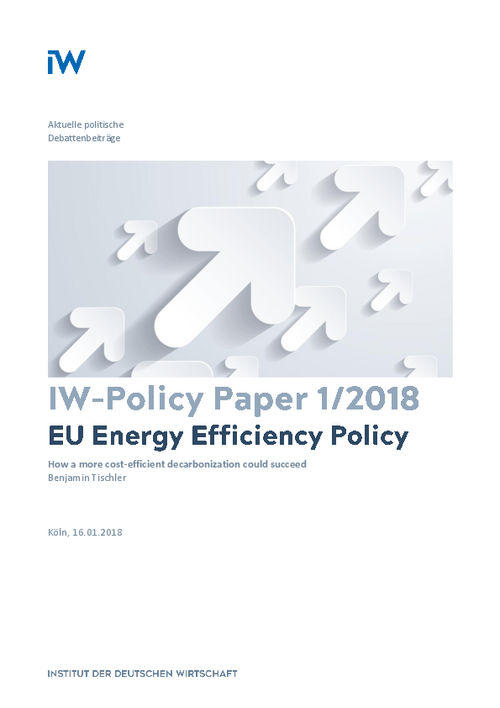At EU level, new proposed legislation for a clean-energy policy is being adopted. New policies are currently being discussed regarding the increased reduction of CO2 emissions, as well as EU-wide energy consumption targets for the year 2030 and national energy efficiency targets and measures to be derived from them. But what happens when the proposed objectives contradict and undermine each other?

EU Energy Efficiency Policy: How a more cost-efficient decarbonization could succeed
IW Policy Paper

At EU level, new proposed legislation for a clean-energy policy is being adopted. New policies are currently being discussed regarding the increased reduction of CO2 emissions, as well as EU-wide energy consumption targets for the year 2030 and national energy efficiency targets and measures to be derived from them. But what happens when the proposed objectives contradict and undermine each other?
A restrictive energy consumption target can become a major obstacle to achieving the overall energy and climate-policy objective of cost-effective decarbonization of the energy system. Economic policy instruments for increasing energy efficiency in the EU ETS sectors can make it more difficult to achieve decarbonization at minimal cost. Energy efficiency targets and the corresponding economic policy measures can however make a worthwhile contribution in sectors not included in the EU ETS.
Instruments for increasing energy efficiency should aim at improving technical energy efficiency. With that in mind, the conception of quantitative targets and tools must be improved. The macroeconomic indicators for “energy efficiency” and “energy intensity” used thus far are unsatisfactory as simple political objectives and lead to wrong conclusions regarding the success of the economic policy instruments being used. The indicators must be decisively improved, for example, by considering factors such as business cycle and economic growth, as well as the proportion of renewable energy or of energy-intensive and less energy-intensive sectors. Furthermore, a better database is necessary.

Benjamin Tischler: EU Energy Efficiency – Policy How a more cost-efficient decarbonization could succeed
IW Policy Paper

More on the topic

Climate Clubs as a Lightning Rod for Tensions in Trade and Industrial Competitiveness
The Paris Agreement has established a transformative paradigm. While this transformation will create winners and losers, it now seems increasingly clear that overall, there are tremendous opportunities.
IW
German Industry's Options for a Secure Supply of Raw Materials
In recent years German industry has seen a rise in the risks attached to its procurement of raw materials.
IW